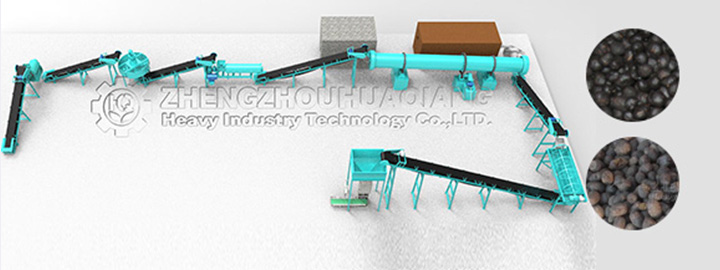Bio-organic fertilizer production lines use organic waste as raw material and transform it into high-quality fertilizer through scientific processes. This injects green energy into agricultural production, addresses the challenges of traditional farming practices from multiple perspectives, including soil, crops, and ecology, and serves as a crucial pillar for promoting high-quality agricultural development.

It is a "guardian" of soil health. Long-term application of chemical fertilizers can easily lead to soil compaction and loss of fertility. However, bio-organic fertilizer, after being composted and fermented on the production line, contains rich organic matter and beneficial microorganisms. These substances improve soil aggregate structure and enhance its water and fertility retention capacity. Beneficial microorganisms (such as Bacillus subtilis) also activate fixed phosphorus and potassium in the soil, increasing its effective nutrient content. Compared to traditional farming practices, soils using bio-organic fertilizers can significantly increase their organic matter content. Long-term use can gradually loosen compacted soil, laying a solid foundation for crop growth.
It serves as a "balance valve" in the agricultural ecosystem. On the one hand, the bio-organic fertilizer production line converts organic waste such as livestock and poultry manure and straw into fertilizer, solving the pollution problem caused by the indiscriminate storage of agricultural waste and achieving "waste-to-treasure" transformation. On the other hand, bio-organic fertilizer replaces some chemical fertilizers, reducing environmental problems such as eutrophication of water bodies and accumulation of heavy metals in soil caused by fertilizer runoff. Furthermore, the production line's accompanying environmental protection facilities (such as biofilters and dust collectors) ensure a zero-pollution production process, forming a "waste-fertilizer-crop-waste" cycle and contributing to sustainable agricultural ecology.
It also reduces planting costs and ensures farmers' profits. Bio-organic fertilizer has a long-lasting effect, and a single application can meet the needs of crops at multiple growth stages, reducing the number of fertilization applications and labor costs. Furthermore, the production line can customize fertilizers based on the soil and crop characteristics of different regions, avoiding nutrient waste. In the long term, the use of bio-organic fertilizer can reduce the occurrence of pests and diseases, reduce pesticide use, and significantly reduce overall planting costs, ensuring stable income growth for farmers.
The bio-organic fertilizer production line is not only a carrier for fertilizer production, but also a bridge connecting ecological protection and agricultural income growth, providing a practical solution for the green transformation and sustainable development of agriculture.